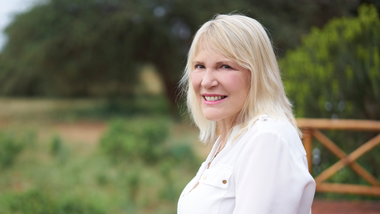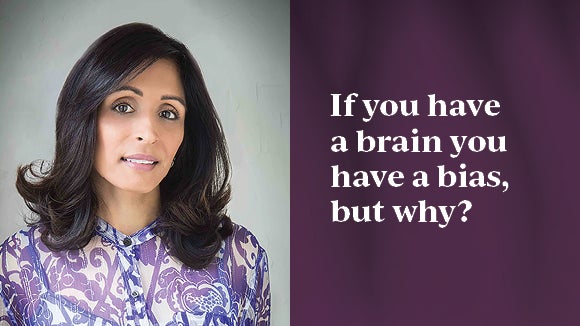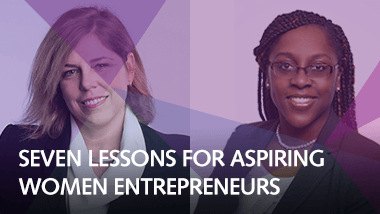Empowering the women of Tsavo through farming and business innovation

Molly Bedingfield is founder and CEO of Global Angels, an international charity transforming disadvantaged communities around the world. Since 2017, the Robert Walters Group has partnered with the Global Angels Foundation to support the Itinyi Valley community in Tsavo.
With over 25 years’ experience of working in the charity sector, Molly is a passionate advocate for delivering impactful and transformative change. Her work with Global Angels is helping the people of Tsavo, Kenya, build a sustainable future. We talk to Molly about how Global Angels’ innovative approach to testing new farming practices has transformed the local community, as well as how Molly has helped to empower the women of the community through the developing innovative business practices.
What inspired you to set up Global Angels?
After working with various international charities over several years, it became clear to me that there was a growing disillusionment with the sector; people had begun to lose faith and charities needed a new operational model to revive it. Having seen the needs of some of the most disadvantaged communities around the world, I felt very strongly that I wanted to be that change maker – I had a platform I could use to do more.
It was this realisation that led me to found my own charity, Global Angels, and introduce The Global Angels 100% Promise, which guarantees that every penny received from public donations goes directly to providing tangible on-the-ground resources, including water wells, classroom buildings and medical clinics.
What role does innovation play in the project in Tsavo in helping the community to build a sustainable future.
In essence, everything we are doing is innovative as we are reviving principles of agriculture that were lost during the industrial revolution and bringing them back through experimental and regenerative organic farming practices. We are establishing innovative farming techniques which can act as a model and blueprint for similar regions to implement as well. We’re hoping that the success of our farming practices will allow neighboring regions and communities to use the same farming techniques as us.
One example of innovation is the implementation of the ‘zero tillage’ method on our lands. The traditional way before sowing seed, is to plough the soil with a tractor or oxen, both of which are expensive. We chose to not till the land, but instead simply removed the noxious weeds, leaving the rest as a protection from the harsh sun rays. Zero tillage keeps more moisture in the soil and prevents it from becoming acidic.
The results have been fantastic. Despite a challenging three years of drought, the minimal rainfall we had in December allowed us to grow meter-high sorghum and different varieties of beans and peas. Due to the zero-tillage method, our lands are now green whereas neighboring lands are barren. We’re excited to share our method with local farms so they too can build sustainable farming practices and secure their future.
What was it that motivated you to empower women in Africa?
I have seen such incredible suffering of women in drought-stricken regions of Africa. It is often customary for them to walk incredibly long distances (an average of 15km) every day to fetch water from sources which animals also drink from. Unfortunately, collecting water takes many hours out of a woman’s day, and the water puts both them and their children at risk from disease. I found it heart-breaking to witness their suffering given how much love these women have for their children. As a mother and grandmother, myself, I felt deeply called to help them.
That’s why I am so passionate over the Global Angels Safe Water and Land Regeneration Programme which the Robert Walters Group significantly contributed towards through the Global Walks to Kenya fundraiser initiative where employees all around the world walked, ran or swam a collective total of 6,000 miles and raised an outstanding £17,254. These funds allowed us to line and cover three water pans which can collect and store 1 million litres of rainwater, build a water kiosk to provide life-giving water to the community in times of serious drought, make gabions in gullies to prevent further soil erosion and build contour swales on 11 acres of farmland as part of our land regeneration programme. Empowering women so that they can empower themselves and build a sustainable future has been extremely rewarding and fulfilling.
What are some of the key Global Angels projects which specifically champion local women and how do they work to bring equality and equity for all?
At the Global Angels farm we are training and employing local women. We have started women’s Shamba (farming) groups to introduce local women to farm small plots of land, while helping them learn regenerative farming and circular economy principles.
An example of this is how we trained and employed them to build swales on our farm and one of our neighbour’s farms. Swales are contoured trenches which control the flow of rainwater thereby preventing precious topsoil being washed away and instead allow the rainwater to seep into the land and nourish the crops.
One day per week, the community would come together and work on land which was allocated to one of our female farmers. By collaborating, the women were able to build an average of 100 meters of swale per day. The following week the women collaborated to build swales on the next plot. After 12 weeks all six women and their families had 200 meters of swale on their plots, which was an incredible achievement for them all.
We also empower local women to build their own small businesses. By providing them with training and passing on knowledge learnt from experimenting with different farming practices, the women will be able to maximise their chicken, goat or bee farming businesses. We will be teaching them how to make goat’s cheese, which they can sell alongside their goat’s milk and honey through our Global Angels Farm Shop. There is a high demand for goat’s cheese in the coastal areas of Africa, where a lot of expatriates live and enjoy that produce. We will thus be able to capitalise on this demand and sell the products the women have been producing. Our plan is for women in the local community to teach each other what they have learnt from us and to likewise be able build their own sustainable future.
What have you learned about entrepreneurship and leadership?
I think we’re living in a unique time in history where women's voices are increasingly being encouraged and heard. As a result, we’re undergoing a fundamental shift in our approach to leadership. As the new generation emerges, we’re seeing a flatter management style, where collaborative working is preferred over ‘top-down’ management. I believe this is a great opportunity for women to step up as it offers a much wider scope for defining successful leadership.
At an earlier stage in my career, I felt that success and career progression could only be achieved if I shaped myself into a certain mould and I spent a lot of energy conforming to that pressure. However, I’ve since learnt that being myself is far more powerful, enabling me to deliver a greater impact and achieve far more job satisfaction. This is why I love being an entrepreneur; it gives me the opportunity to facilitate change and champion others. It’s a great privilege and I feel very lucky to be able to work alongside some truly inspiring people.
For me, having a strong network of people I trust is crucial to success and my authenticity plays a key role in establishing that trust. I’ve experienced some very difficult working relationships, and, although these were painful experiences, they’ve helped me to realise how important it is to have people around you that want to help drive your success.
What are your top three pieces of advice for women wanting to succeed in their career?
- Surround yourself with a good support network of people you trust, people that believe in you and want to help you succeed.
- If you’re a leader, be a champion for others and be prepared to be a mentor and to open doors for those you believe in. Be the example you’d want to be led by.
- Finally, and the key piece of advice would be to learn how to be a true listener to all those you engage with. Remain curious and offer that safe place for others to share their thoughts, feelings and ideas.
Share this:





